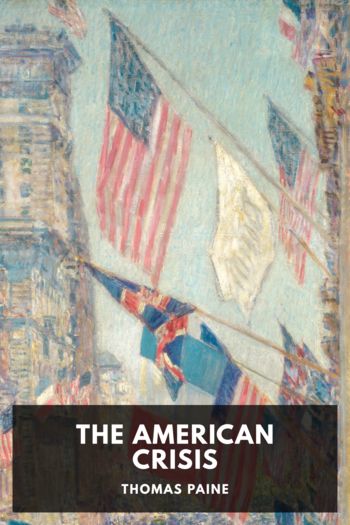The American Crisis, Thomas Paine [pdf to ebook reader TXT] 📗

- Author: Thomas Paine
Book online «The American Crisis, Thomas Paine [pdf to ebook reader TXT] 📗». Author Thomas Paine
As you have already made your exit from the moral world, and by numberless acts both of passionate and deliberate injustice engraved an “here lieth” on your deceased honor, it must be mere affectation in you to pretend concern at the humors or opinions of mankind respecting you. What remains of you may expire at any time. The sooner the better. For he who survives his reputation, lives out of despite of himself, like a man listening to his own reproach.
Thus entombed and ornamented, I leave you to the inspection of the curious, and return to the history of your yet surviving actions. The character of Sir William has undergone some extraordinary revolutions, since his arrival in America. It is now fixed and known; and we have nothing to hope from your candor or to fear from your capacity. Indolence and inability have too large a share in your composition, ever to suffer you to be anything more than the hero of little villainies and unfinished adventures. That, which to some persons appeared moderation in you at first, was not produced by any real virtue of your own, but by a contrast of passions, dividing and holding you in perpetual irresolution. One vice will frequently expel another, without the least merit in the man; as powers in contrary directions reduce each other to rest.
It became you to have supported a dignified solemnity of character; to have shown a superior liberality of soul; to have won respect by an obstinate perseverance in maintaining order, and to have exhibited on all occasions such an unchangeable graciousness of conduct, that while we beheld in you the resolution of an enemy, we might admire in you the sincerity of a man. You came to America under the high sounding titles of commander and commissioner; not only to suppress what you call rebellion, by arms, but to shame it out of countenance by the excellence of your example. Instead of which, you have been the patron of low and vulgar frauds, the encourager of Indian cruelties; and have imported a cargo of vices blacker than those which you pretend to suppress.
Mankind are not universally agreed in their determination of right and wrong; but there are certain actions which the consent of all nations and individuals has branded with the unchangeable name of meanness. In the list of human vices we find some of such a refined constitution, they cannot be carried into practice without seducing some virtue to their assistance; but meanness has neither alliance nor apology. It is generated in the dust and sweepings of other vices, and is of such a hateful figure that all the rest conspire to disown it. Sir William, the commissioner of George the Third, has at last vouchsafed to give it rank and pedigree. He has placed the fugitive at the council board, and dubbed it companion of the order of knighthood.
The particular act of meanness which I allude to in this description, is forgery. You, sir, have abetted and patronized the forging and uttering counterfeit continental bills. In the same New York newspapers in which your own proclamation under your master’s authority was published, offering, or pretending to offer, pardon and protection to these states, there were repeated advertisements of counterfeit money for sale, and persons who have come officially from you, and under the sanction of your flag, have been taken up in attempting to put them off.
A conduct so basely mean in a public character is without precedent or pretence. Every nation on earth, whether friends or enemies, will unite in despising you. ’Tis an incendiary war upon society, which nothing can excuse or palliate—an improvement upon beggarly villany—and shows an inbred wretchedness of heart made up between the venomous malignity of a serpent and the spiteful imbecility of an inferior reptile.
The laws of any civilized country would condemn you to the gibbet without regard to your rank or titles, because it is an action foreign to the usage and custom of war; and should you fall into our hands, which pray God you may, it will be a doubtful matter whether we are to consider you as a military prisoner or a prisoner for felony.
Besides, it is exceedingly unwise and impolitic in you, or any other persons in the English service, to promote or even encourage, or wink at the crime of forgery, in any case whatever. Because, as the riches of England, as a nation, are chiefly in paper, and the far greater part of trade among individuals is carried on by the same medium, that is, by notes and drafts on one another, they, therefore, of all people in the world, ought to endeavor to keep forgery out of sight, and, if possible, not to revive the idea of it. It is dangerous to make men familiar with a crime which they may afterwards practise to much greater advantage against those who first taught them. Several officers in the English army have made their exit at the gallows for forgery on their agents; for we all know, who know anything of England, that there is not a more necessitous body of men, taking them generally, than what the English officers are. They contrive to make a show at the expense of the tailors, and appear clean at the charge of the washerwomen.
England, has at this time, nearly two hundred million pounds sterling of public money in paper, for which she has no real property: besides a large circulation of bank notes, bank post bills, and promissory notes and drafts of private bankers, merchants and tradesmen. She has the greatest quantity of paper currency and the least quantity of





Comments (0)